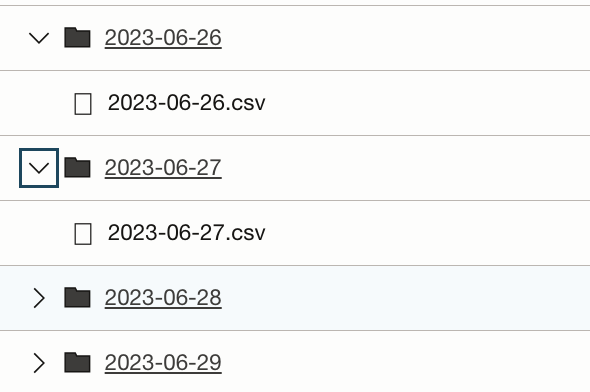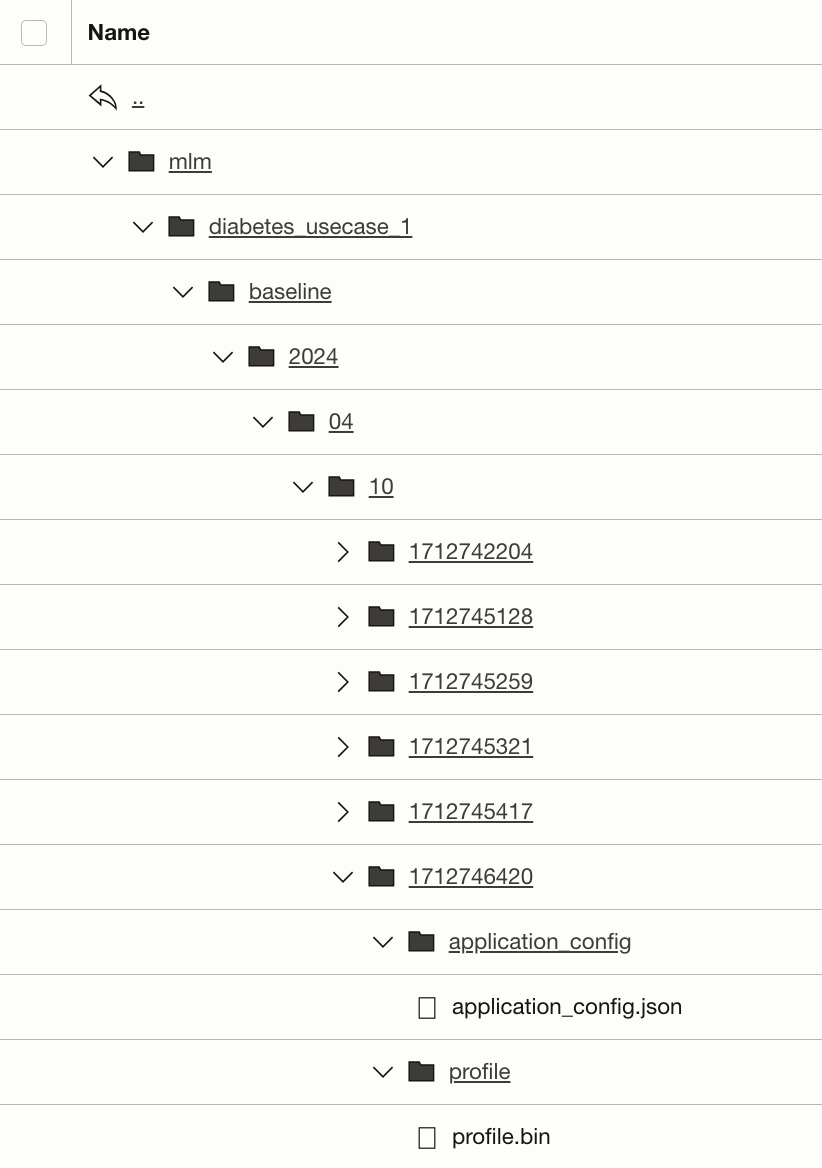Baseline Run¶
A ML Monitoring Application Run can be specifically defined as a Baseline Run, when one wants to calculate the performance drift with respect to other ML Monitoring Application Runs using the ActionType as RUN_BASELINE.
Baseline runs are essential for assessing the effectiveness and improvements of subsequent analyses or configurations. They provide a basis for detecting deviations or changes in data behavior over time and for identifying areas where further optimization may be needed.
How to use it¶
Here is a simple sample configuration to run the baseline run using Ml Monitoring Application
In order to run baseline run using Ml monitoring Application, user needs to configure a baseline_reader in the application configuration - Application Configuration, a Baseline Reader is responsible for reading the baseline data required for metric evaluation.
Below are the sample configurations for baseline reader which supports a simple file path of OCI Object storage location
"baseline_reader": {
"type": "CSVDaskDataReader",
"params": {
"file_path": "<OCI_STORAGE_FILE_PATH_FOR_BASELINE_INPUT_DATA>"
}
}
Examples:
"baseline_reader": {
"type": "CSVDaskDataReader",
"params": {
"file_path": "oci://<bucket_name>@<namespace>/<object_prefix>/dataset.csv"
}
}
If file path contains multiple data files:
"baseline_reader": {
"type": "CSVDaskDataReader",
"params": {
"file_path": "oci://<bucket_name>@<namespace>/<object_prefix>/*.csv"
}
}
Configuration required for running Baseline Run
CONFIG_LOCATION: This is the HTTP location of oci storage application config, which is a mandatory parameter to kick start baseline run. The application config must have a read access to the specified HTTP location for the OCI resources needed to run the baseline run.
RUNTIME_PARAMETER: Runtime parameter are the parameters that defines the state of a single monitor run. In order to specify, if a monitor run is baseline run, user needs to pass ACTION_TYPE as RUN_BASELINE as one of the arguments of runtime parameters as shown below.
"CONFIG_LOCATION": "<HTTP_LOCATION_OF_OCI_STORAGE_APPLICATION_CONFIG_FILE_PATH>"
"RUNTIME_PARAMETER": "{"ACTION_TYPE":"RUN_BASELINE"}"
In case of Partition Data based on Date Time supported format, user needs to include a specific data source in the application config for the baseline reader using ObjectStorageFileSearchDataSource and must have partition_based_date_range as shown below.
The partition data which needs to be filtered for the baseline run evaluation must follow the below structure with start and end dates mentioned in the filter_args parameters.

"baseline_reader": {
"type": "CSVDaskDataReader",
"params": {
"data_source": {
"type": "ObjectStorageFileSearchDataSource",
"params": {
"file_path": [
"oci://<bucket_name>@<namespace>/<object_prefix>/dataset.csv"
],
"filter_arg": [
{
"partition_based_date_range": {
"start": "2023-06-26",
"end": "2023-06-27",
"data_format": ".d{4}-d{2}-d{2}."
}
}
]
}
}
}
}
"post_processors": [
{
"type": "SaveMetricOutputAsJsonPostProcessor",
"params": {
"file_name": "profile.json",
"test_results_file_name": "test_result.json",
"file_location_expression": "profile-$start_$end.json",
"date_range": {
"start": "2023-08-01",
"end": "2023-08-05"
},
"can_overwrite_profile_json": false,
"can_overwrite_test_results_json": false,
"namespace": "<NAMESPACE>",
"bucket_name": "<BUCKET_NAME>"
}
},
{
"type": "OCIMonitoringApplicationPostProcessor",
"params": {
"compartment_id": "<COMPARTMENT_ID>",
"namespace": "<NAMESPACE>",
"date_range": {
"start": "2023-08-01",
"end": "2023-08-05"
},
"dimensions": {
"key1": "value1",
"key2": "value2"
}
}
}
]
The start and end date mentioned in the above baseline_reader (only for ObjectStorageFileSearchDataSource) and for post processor SaveMetricOutputAsJsonPostProcessor, OCIMonitoringApplicationPostProcessor if present in the application configuration, can be overwritten using runtime parameter configuration DATE_RANGE as shown below, without uploading the new application configuration.
The given runtime parameters for the DATE_RANGE overrides the start and end filters of the ObjectStorageFileSearchDataSource, SaveMetricOutputAsJsonPostProcessor and OCIMonitoringApplicationPostProcessor present in the application configuration. .. code-block:: bash
“CONFIG_LOCATION”: “<HTTP_LOCATION_OF_OCI_STORAGE_APPLICATION_CONFIG_FILE_PATH>” “RUNTIME_PARAMETER”: “{“ACTION_TYPE”:”RUN_BASELINE”, “DATE_RANGE”:{“start”:”2023-06-28”, “end”:”2023-06-29”}}”
Output of Baseline Run¶
When the action type is a baseline run the application will do the following -
Internal Application State¶
Profile and Application configuration are stored for a monitor run which will be used in subsequent runs for comparison and metric calculating like drift metrics etc.
A profile will be written in the location specified in the storage_details section of the application configuration file in the storage_details section. This Profile stores summary about data. It includes the profile header as well as information about features, metrics.
<location>/MLM/<monitorId>/baseline/<Year>/<Month>/<Day>/<monitor_run_id>/profile/profile.binApplication configuration passed by the user will be saved in the storage_details section of the application configuration
<location>/MLM/<monitorId>/baseline/<Year>/<Month>/<Day>/<monitor_run_id>/application_config/application_config.json
User Configured Output¶
If post processor is provided in the config the default application will execute the post processors and store the store the output if required by that Post processor to the location mentioned in Post Processor section.
The logs would be written in the log group details provided while setting up the ML Job.
Note
Here monitor_run_id is (epoch time stamp of run).